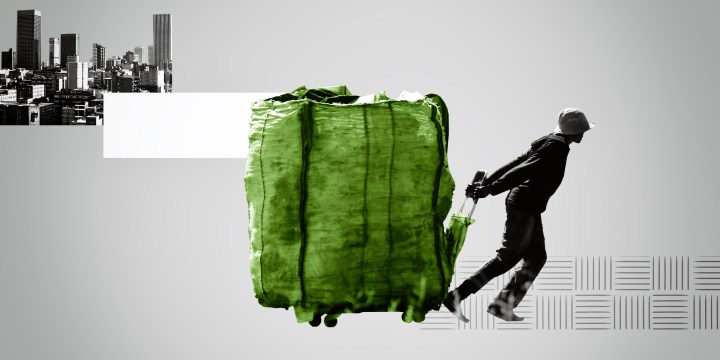PCC EXPERT SERIES – OUR PEOPLE
Waste pickers need formal recognition, and full and fair remuneration for their services

While most waste reclaiming activities are animated by survival, there is no denying that informal recyclers are worthy first responders in the pursuit of a climate-resilient world within the recycling economy. What is absent is a recognition of their valuable contribution towards sustainability and a regularisation of their activities.
One of the dominant themes to emerge from COP26 is the plea championed by developing countries to include issues of equity, fairness and justice in the push towards climate change resilience, in what is now dubbed a just transition. Developing countries are concerned that the transition towards a sustainable future may, through inadvertent or wilful neglect, visit collateral economic hardship upon the most vulnerable in our deeply unequal world.
At a basic level, the global dialogue must accommodate a diversity of voices, particularly from developing countries, which should be listened to and heard so that their transition-induced anxieties and aspirations find expression in climate change commitments. If we fail at this, the sustainable and future-fit world we all are striving for will remain beyond our collective grasp.
Informal waste collectors
Nothing underscores the importance of a just transition more than the social and economic injustice meted out to informal waste reclaimers, who are now a feature of the developing world’s rapidly urbanising cities. They are usually found rummaging through waste bins in search of salvageable reusables and high-value recyclables to sell for a living.
Undeniably, their waste collection activities reveal the full depth of urban poverty. But to merely interpret their precarious reality in terms of a futile battle against urban poverty is to strip them of their real lived experiences. While their story is indeed one of deprivation of the basic essentials of life, it is also a story of inspirational collective agency, demonstrating how the vulnerable in our urban spaces can assert their right to belonging and livelihood.
Far from being merely informal and survivalist, informal waste collection contributes significantly to the sustainability of urban waste streams through recycling and reuse. While most waste reclaiming activities are animated by the instinct of survival, rather than by contemporary notions of natural resource efficiency and economic circularity, there is no denying that informal recyclers are worthy first responders in the pursuit of a future-fit and climate-resilient world within the recycling economy. What is absent is a recognition of their valuable contribution towards sustainability and a regularisation of their precarious and unremunerated activities.
A stunning reversal after KZN floods — the ANC now guilty until proven innocent
Impact of waste pickers
The itinerant and informal nature of South Africa’s informal waste pickers movement makes its size hard to establish with much certainty. Estimates range between 60,000 and 90,000 kerbside and landfill waste reclaimers. Their ranks include South Africa’s homeless, as well as immigrants, mainly from neighbouring countries. Most are indigent, with little to no formal education.
However, a few have had formal education, including high school qualifications. Some have experience in skilled and semi-skilled industrial work, while others are driven by pure entrepreneurial zeal and ambition within the emerging circular economy. One thing they have in common is their victimisation by an unjust socioeconomic system that appears to be embarrassed and ashamed by their existence. The same unjust system seems to believe that rendering them invisible, instead of embracing them unconditionally, is the best way to acknowledge their desperate condition and address their needs.
Waste reclaimers play an important role in municipal waste collection systems, diverting substantial volumes of solid waste from overflowing landfill sites. Following their study conducted at buy-back centres in Cape Town, Barnes et al were able to show that waste reclaimers collect about 17,100 tonnes of recyclables per month, while saving about 41,800 cubic metres per month of landfill air space. Linda Godfrey et al and Plastics SA have shown that informal waste pickers collect between 70 and 90% of post-consumer paper and packaging waste. The material thus collected is sorted and sold for pre-processing at networks of buy-back centres, waste transfer stations and recycling companies, which in turn export it or sell it to local manufacturing companies to be utilised as raw material.
The nature of their work
Waste reclaimers’ activities can entail sophisticated planning and organisation, which is often inappreciable to municipal officials and the public. In a 2017 study of informal waste pickers operating across the eight regions falling under its territory, “The Empowerment of Joburg Waste Pickers,” the City of Johannesburg observed that effective waste collection entails making choices that balance competing elements of its operations.
The study shows that choices include selecting and targeting areas with potentially high volumes of valuable recyclables, optimising travel routes and selecting a course that minimises uphill slopes, monitoring daily road traffic patterns for ease of passage, packing manoeuvrable loads of recyclables in bags and on trolleys, and operating near buy-back centres likely to pay more for their wares. The use of smart mobile devices for real-time exchange of price signals across buy-back centres is also well established among reclaimers.
The City of Johannesburg also showed that reclaimers prefer to form partnerships and collaborative networks across its domains. While this practice was found to be critical for sharing price and other market information, it also increased the volume of recyclables by widening the collection area. The city has sought to enhance this emerging adaptive capacity among recyclers by supporting their efforts to organise into cooperatives. Once fully functional and efficient, these cooperatives should be able to leverage their internal and external collection networks not only to assert their rights of legitimacy and recognition but also to reach economies of scale.
Informal waste collection is physically demanding drudgery, often performed under harsh weather and climate conditions, to which waste pickers have had to adapt. However, during interviews with them, it became evident that the flexible waste collection schedules and the cash-based nature of recyclables trading transactions are cherished features of their work.
According to interviews of informal waste pickers conducted by Khumba Energy in 2017 on behalf of the City of Johannesburg, most waste pickers prefer to start their collection activities very early in the morning, ahead of municipal waste collection trucks, so as to have the first pick of valuable recyclables.
Integration of informal waste pickers
That recognising and integrating waste reclaimers will help create a sustainable urban environment, while also fostering social justice and inclusivity, is relatively easy to understand. What is highly contested is the approach and the form that their integration and recognition should take.
Melanie Samson argues that informal waste reclaimers have already forcefully taken their place in the municipal waste management system, so we should not assume that they are waiting patiently to be integrated. Broader efforts to recognise and formalise their roles are nonetheless essential. The prevailing arrangement, with a formal municipal system of waste management operated in partnership with the private sector and a parallel, equally competent but still informal, unremunerated and underresourced system of waste picking, is unsustainable and perpetuates inequality and injustice. The two systems should be combined into one efficient, fair and just system of waste management service provision.
Foraging for integration experiments
The integration pathway is well travelled, as exemplified by the efforts of cities such as Belo Horizonte, Brazil. Belo Horizonte’s willingness to experiment and learn from experience offers a model of how best to formalise and recognise reclaimers. The city government started on the integration path in the early 1990s, focusing on building a grassroots movement of reclaimers, with the assistance of the government and civil society. It signed an agreement with the reclaimers’ association, making the association the preferred service provider for selected waste collection activities.
In a demonstration of rare political will, in 2007 the national government passed a law allowing municipalities to exclusively contract with and pay reclaimers to collect selected waste streams. Belo Horizonte waste pickers have also won state, federal, and municipal recognition of their status in the waste sector, with laws amended to facilitate their integration.
In its pioneering integration approach, the City of Belo Horizonte recovers recyclables from the domestic solid waste stream and delivers these for processing to warehouses operated by informal waste pickers. The processed recyclables are sold to industry, with proceeds channelled back to the cooperatives for distribution among their members.
By 2008, cooperatives were collecting up to 52% of recyclables from non-residential generators and 13% of all recyclables from drop-off stations across the city. Other indirect benefits for cooperatives included the establishment of workshops for making and maintaining waste trolleys used by their members, as well as establishing a value-adding pellets production company. These two value-adding initiatives helped widen the cooperatives’ revenue base and thereby enhanced sustainability.
Integration in the local municipal sphere
The City of Johannesburg has been at the forefront of integration initiatives across local government. It has also been instrumental in the establishment and continued support of the South African Waste Pickers Association, a membership-based national movement to organise and mobilise informal waste reclaimers.
Various municipalities are starting to grapple with the integration conundrum, some with bold intentional statements but little action. Unfortunately, most find integration daunting because it calls for new ways of engaging and contracting with marginalised but proactive and vociferous stakeholders, something the municipalities are ill-equipped to handle.
We ought to do better
Current integration moves fail to go far enough in challenging the status quo. Authentic and sustainable integration ought to challenge existing notions of municipal waste management systems and the dominant power relations that hold current participants together. To date, no effort has proved able to reposition waste pickers within the municipal waste system’s hierarchical power structure.
It seems that municipal waste management systems, and indeed extended producer responsibility laws, are not ready to accommodate waste pickers. Current waste legislation has mapped out a role for every potential participant in the national waste management value chain, but its silence is deafening when it comes to integrating waste reclaimers. The integrated waste management plans, which existing legislation requires municipalities to file, do not recognise the existence of reclaimers.
Sustainable and just integration
Integration comes in different modes: the top-down variety, fully adorned with the language of empowerment; collaborations bringing together reclaimers and industry associations; public-private partnerships; freestyle and improvised integration driven by municipal initiatives; and collaborations between reclaimers and residents.
At a conceptual level, the starting point for meaningful integration is the dismantling and restructuring of established practices within the procurement system for waste management, which currently benefits the private sector disproportionately, while exploiting the precarious status of informal waste pickers. All listed integration modalities should have a role to play in arriving at an integrated, efficient and fair waste management system, with equitable and just participation by municipalities, the private sector, residents, industry and waste reclaimers.
At a practical level, informal waste pickers need to be organised into formal cooperatives, small and medium enterprises and entrepreneurial entities that would be supported and remunerated fairly for the services rendered, in the same way as established private-sector entities.
Although cooperatives in the recycling economy fail at an alarmingly high rate, with sufficient support, they should in time prove their worth, especially in South Africa, where levels of entrepreneurship and business literacy leave much to be desired. The City of Johannesburg led the way in this respect, not only incentivising the creation of cooperatives among waste recyclers but also offering them training in environmental laws, the circular economy, entrepreneurship, and health and safety, as detailed in their 2017 study. Samson views cooperatives as important to integration if they receive adequate ongoing support.
The waste economy presents immense possibilities and opportunities for entrepreneurship and job creation. The introduction of extended producer responsibility is expected to help grow the sector into a sustainable contributor to the economy.
Integration must therefore also approach waste recycling as an entrepreneurial endeavour with significant socioeconomic benefits for a global economy that seeks to recirculate scarce and finite natural resources. Industrial-scale waste collection systems need to be disaggregated into small collection subsystems that operate in small networked clusters even in townships, where municipal waste collection systems have all but collapsed.
In a country such as ours, where the rate of unemployment, especially among young people, is as high as it is unsustainable, waste collection and recycling can unlock unskilled and low-skill youth employment opportunities. For this reason, an employment-focused approach to integration within a restructured and attractive municipal waste management system should be the focus. Better collaboration across the many municipal functional domains dealing with the environment, economic development, social development and the green economy will also lead to optimal integration outcomes.
Waste pickers need formal recognition of their activities as important contributors to a climate-resilient and resource-efficient urban environment. Integration and formalisation require that they be fully and fairly remunerated for their services, while also enjoying the full and protected rights of all employees in South Africa.
They must be given the opportunity to develop themselves into viable business enterprises able to grow over time. Their authentic integration transcends the latest recycling trolley designs or pinpoint initiatives presented as extended public works programmes or acts of philanthropy, both of which are unsustainable.
Municipalities must stop talking about waste pickers and instead start talking with them in full appreciation of their agency, and unmatched broad knowledge of the circular economy, its challenges and opportunities. DM/OBP
Read Part One, Part Two and Part Three.
This essay is part of a series that explores challenges and opportunities relating to a just transition in South Africa, with a specific focus on enhancing resilience in ways that improve lives and livelihoods. The series is being published in the lead-up to the Presidential Climate Commission’s multistakeholder just transition conference on 5 and 6 May. This essay series has been produced by the Presidential Climate Commission Secretariat and New Climate Economy, with support from the Danish Ministry of Foreign Affairs. The interpretations and findings set forth in the essays are the authors’ alone.
[hearken id=”daily-maverick/9366″]






















 Become an Insider
Become an Insider
Yes please recognise the important work these people do: it improves the environment for all of us. It is up to government, but as individuals we can also recognise their contribution: whether it be a few sandwiches, soup on a cold day or money – if each household gave even R10- it could mean the difference between meal and hunger that night. More sites would help: the site in Parkhurst is up a steep hill! Good job, we support you – let’s say it to them!